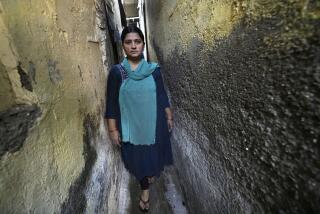Global Development: An Indian activist fights in court to help child brides and grooms win their lives back
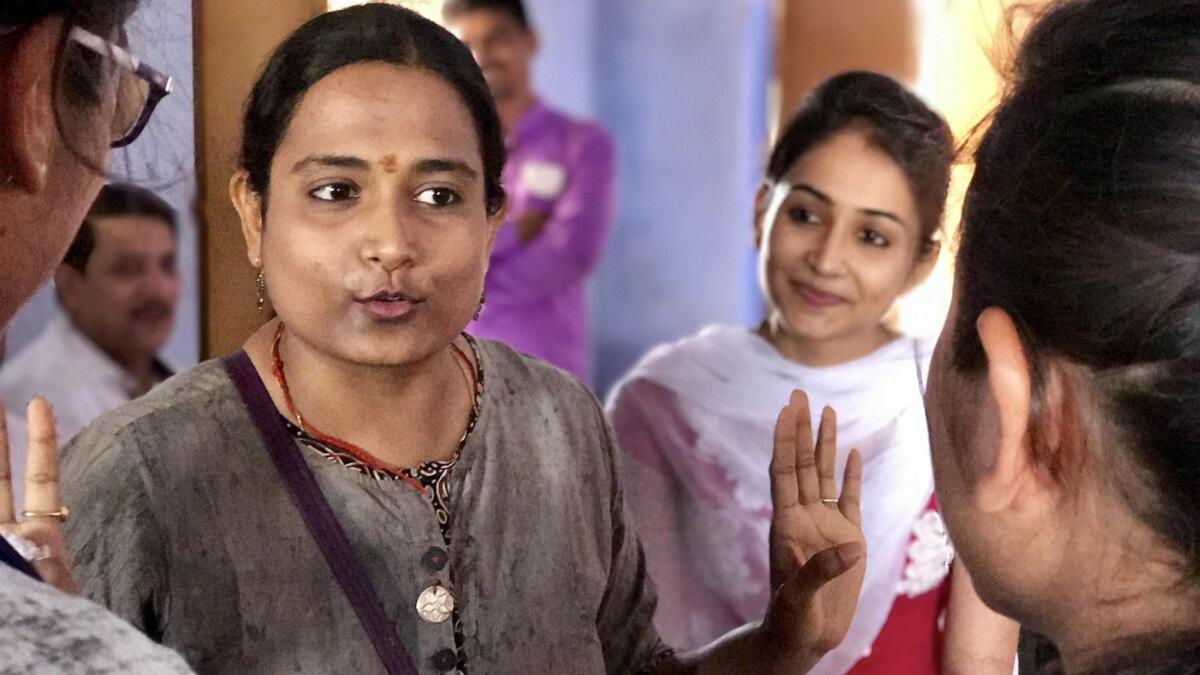
Reporting from Jodhpur, India — The abuse began days after she moved in with her husband. He would come home drunk and force her to have sex. The women in his family hurled insults at her and said she brought bad luck.
Pinki Kumari was only 16, but her fate had been decided much earlier, at age 4, when her parents had a wedding ceremony for her and a boy 10 years older, and said they would live together when she grew up.
When she was sent to his house more than a year ago, the shy teenager who rarely raised her voice above a whisper soon began pleading with her father to let her come home. He refused, afraid to anger her in-laws or challenge the village orthodoxy in India’s Rajasthan state, which has long had one of the world’s highest rates of child marriage.
Then she made a phone call.
The voice that answered was warm and knowing, like that of an older sister, but girded with a steely confidence. Kriti Bharti had fielded hundreds of such calls and knew what to ask: Could she prove her age? Could she prove the wedding took place?
Don’t worry, Bharti said finally. We can get you out of this.
One of India’s most successful campaigners against child marriage, Bharti runs a one-woman hotline for underage brides and grooms in northwestern India, her name and number printed in newspaper articles touting her unique approach: Instead of merely preaching against the illegal marriages, she fights them in court.
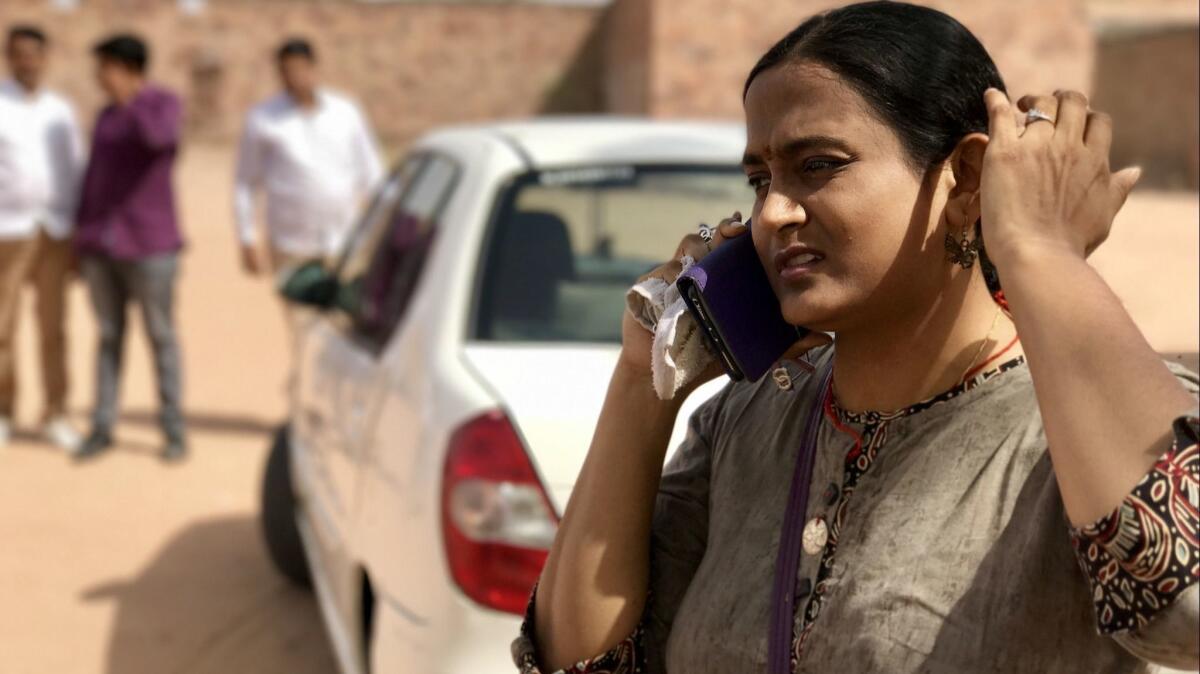
In 2012, Bharti helped obtain the first annulment of a child marriage in India, in the case of a Rajasthani couple who were forced to wed when he was 3 and she was 1. According to custom in these conservative Hindu communities, while weddings are often solemnized at very young ages, a bride typically is sent to live with her husband’s family and consummate the union in her teens.
Bharti has had a total of 36 underage unions canceled and filed cases on behalf of eight more child brides and grooms — including Kumari, now 18 and separated from her husband.
“Child marriage is like a disease: It’s important to prevent it, but when so many are infected, you have to find a way to cure them,” Bharti, 30, said in her office, a second-story apartment in the city of Jodhpur plastered with newspaper clippings and photos of her clients.
India is home to one-third of the roughly 700 million women worldwide who became wives before turning 18, according to UNICEF data. A 2015-2016 national health survey found that more than one-quarter of Indian women ages 20-24 had been married before their 18th birthday.
Despite laws aimed at curbing child marriage — and growing awareness that it contributes to sexual abuse, unsafe pregnancies, lower education rates and greater poverty — ancient views of girls as chattel persist among hidebound Hindus. A lawmaker from India’s Hindu nationalist governing party recently said he supported child marriage as a way to stamp out “vices” such as interfaith relationships.
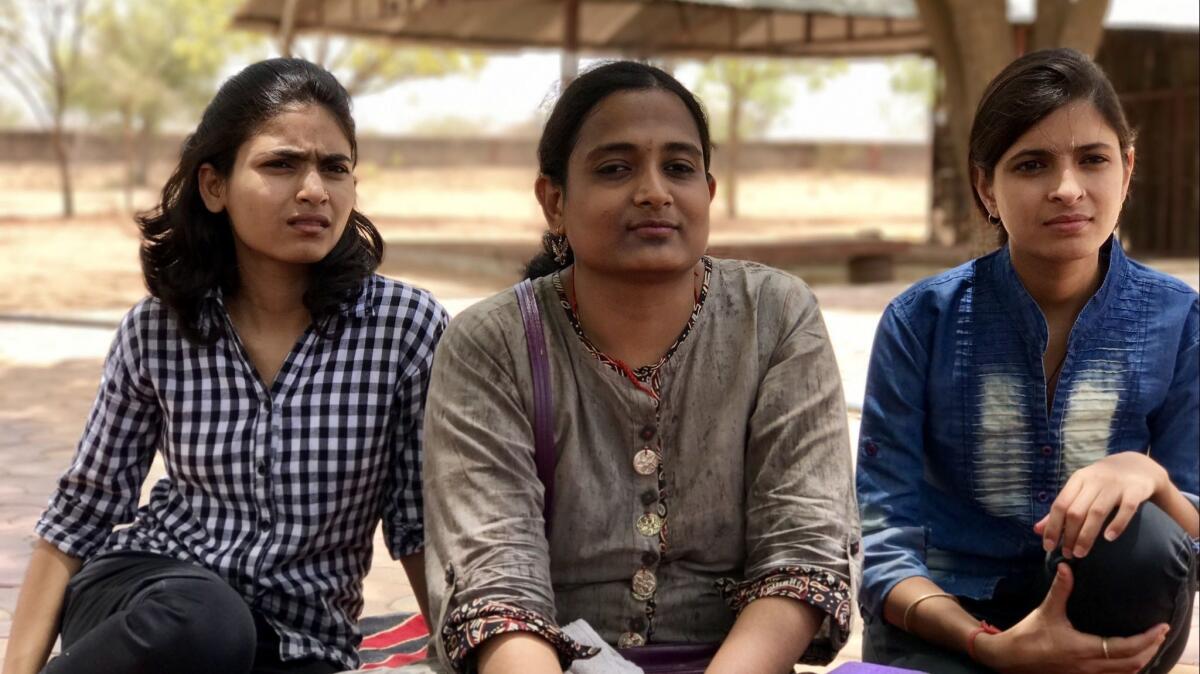
In Rajasthan, a vast and socially conservative desert state, the national survey said that 35.4% of women had been forced into wedlock as girls. Bharti’s phone jingles several times daily with a report of an underage marriage or an inquiry about an annulment.
On a recent afternoon, the ring tone cut through the din of a cafe in Jodhpur’s old city, a maze of arched windows and carved doorways gently moldering in the dust and heat. Bharti flipped open the blue plastic cover and heard a young man’s voice.
He was calling about his sister, who was about to be sent to live with her husband. Bharti asked for a picture of her school report card so she could verify the girl’s age — one of the first keys to filing an annulment case.
Under Indian law, married children can request an annulment up to two years after reaching adulthood, which it defines as 18 for girls and 21 for boys. The provision is part of a 2006 act that imposes jail time and a fine of up to $1,500 for anyone caught participating in a child marriage — but does not automatically render those marriages invalid.
Read more: How child marriage in Nepal takes a toll on boys, too »
Advocacy groups criticize the law for putting the onus on victims to initiate legal proceedings that often require a parent or guardian’s participation — not easy when marriages are the result of community pressure — and court fees and travel costs that can reach into the hundreds of dollars, far exceeding poor families’ incomes.
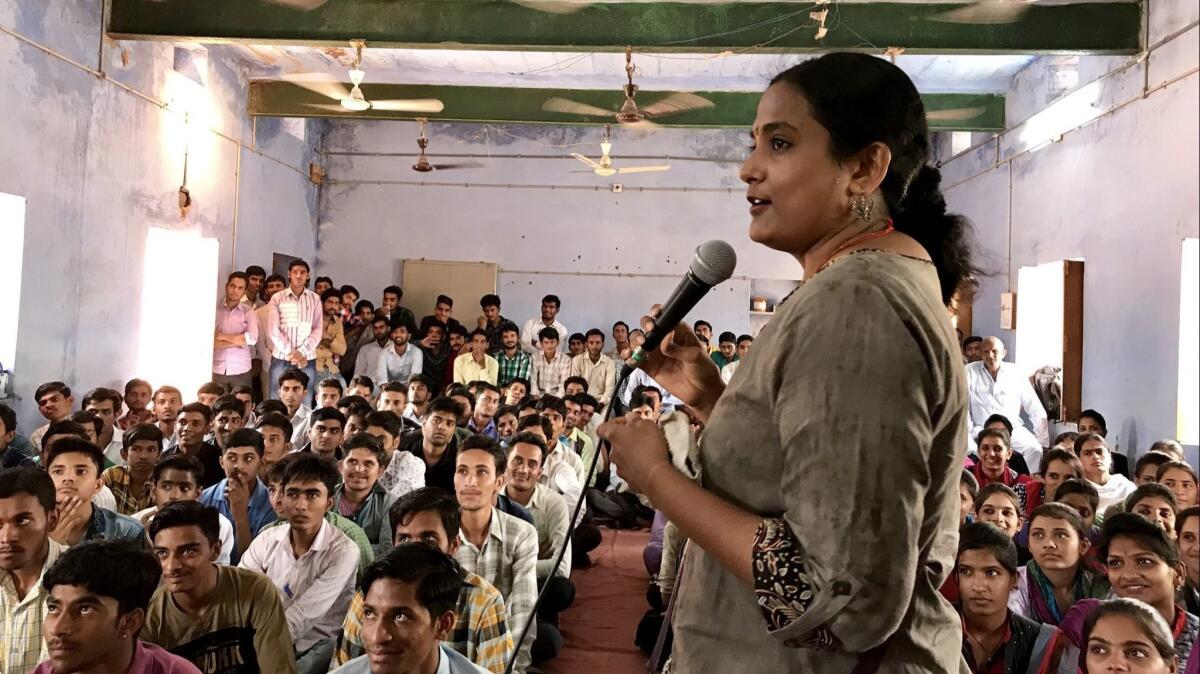
While the Indian government considers amending the law, Bharti and the small nonprofit she founded in 2011, Saarthi Trust, fight to educate children about their rights. Her clients’ struggles, she said, resonate with her own difficult upbringing.
Her father left before she was born, leaving her mother to raise her alone in a family that viewed her as cursed, by turns shunning her and subjecting her to beatings. At 10 she was bedridden with a mysterious illness that subsided only after she sought out a guru who treated her with the Japanese “touch therapy” known as reiki.
Renouncing her family name, Chopra, she took the moniker Bharti, which means “daughter of India.” She taught herself English by reading newspaper columns with a dictionary beside her, making note of every unfamiliar word, and eventually earned a doctorate in psychology from a university in Jodhpur.
A decade ago, when she began counseling child abuse victims, a teenage patient came to her distraught, saying she just learned she’d been married as an infant. Bharti wanted to intervene, but the obvious option, filing for divorce, was unsatisfying.
“In India, there is a social stigma attached to divorce — it is pasted on your head for your entire life,” Bharti said.
Annulment was written into the law, but no one in India had obtained one for an underage marriage. When she did, in 2012, the case made national headlines.
Child marriage is like a disease: It’s important to prevent it, but when so many are infected, you have to find a way to cure them.
— Kriti Bharti
Bharti began visiting Rajasthani villages, riding in the back of taxis across narrow, sand-blown highways, often accompanied by former child brides, to look for girls who wanted to challenge their unions in court.
In 2015, after giving a talk in Rabariyawas, 70 miles east of Jodhpur, Bharti was approached by 18-year-old Mamta Bishnoi, a member of a conservationist Hindu sect that observes strict customs involving females. Bishnoi said that when she was 8, after her great-grandmother died, she and her younger sister were married off in the belief that it would ease the family’s mourning. Her sister was 10 months old.
It was only years later, when she was brought to the groom’s house during a religious festival, that she learned she had been married. The boy was a few years older, had dropped out of school and was known as a drunk.
“I felt like my death was decided,” she said in an interview in Bharti’s office.
Bharti convinced her parents to support annulments. A court granted her sister’s in three days.
But Bishnoi’s husband refused to cooperate, dragging the case out for two years. Finally, Bharti filed the petition just before her 20th birthday. The marriage was nullified this April, although her in-laws continue to fight, saying they will come after her if she tries to marry anyone else.
Bharti’s work often defies Hindu caste leaders who maintain a tight grip on village life. Caste elders have threatened to chop off her nose, gang-rape her and worse. About two years ago, while she was working to secure an annulment for a 16-year-old Bishnoi girl, the girl’s family attempted to kidnap Bharti from a meeting place, she said.
“To these people, I am like a terrorist against their old ways of thinking,” Bharti said.
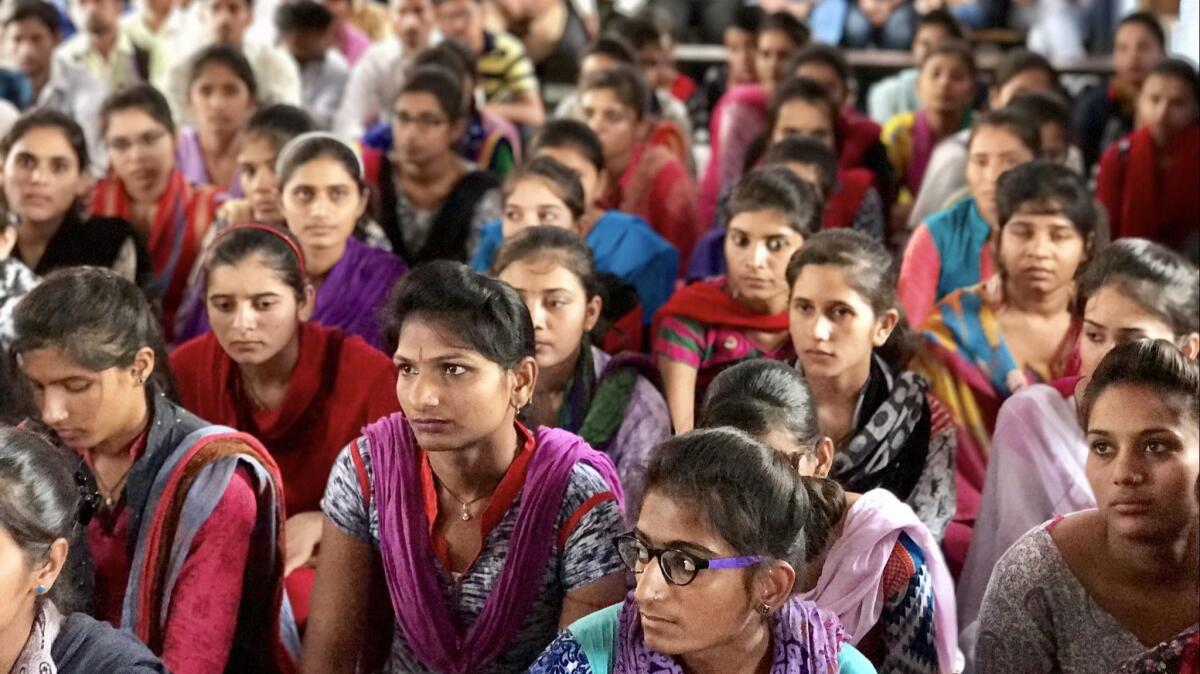
One blistering morning in June, Bharti pulled into the dirt parking lot of a school in Mathania, north of Jodhpur. She stepped into a large classroom where about 100 young people sat cross-legged on the floor, men on one side, women on the other.
As ceiling fans stirred the sticky air, Bharti asked if anyone had witnessed a child marriage. More than half raised their hands.
Bharti handed the floor to Pinki Kanwar, a 19-year-old who at age 10 was married along with her sister into a family she had never met. She obtained an annulment in February and was studying to become a teacher.
Then Pinki Kumari stood up. It was the first time she had ever addressed such a large crowd, and her slender fingers trembled as she gripped the microphone.
After speaking by phone to Bharti several times, Kumari summoned the courage to walk out of her in-laws’ house one afternoon when no one was home. She didn’t return. Her father, a tire repairman, worried about who would look after her, but she told him she was going to live with Bharti, whom she called “didi,” which means sister.
This year she moved into a shelter home Saarthi runs in Jodhpur and is studying for a mass communications degree from a local college. Within months, Bharti hoped, her annulment would be granted.
“If you are facing the same problem as me,” Kumari told the crowd, “you can escape too.”
Before leaving, Bharti read out her phone number. On the road back to Jodhpur, she got a call. “Wrong number,” the voice said, and hung up.
Bharti smiled. “Someone is checking to see if the number works. When they are ready, they’ll call back.”
Shashank Bengali is South Asia correspondent for The Times. Follow him on Twitter at @SBengali
More to Read
Sign up for Essential California
The most important California stories and recommendations in your inbox every morning.
You may occasionally receive promotional content from the Los Angeles Times.


